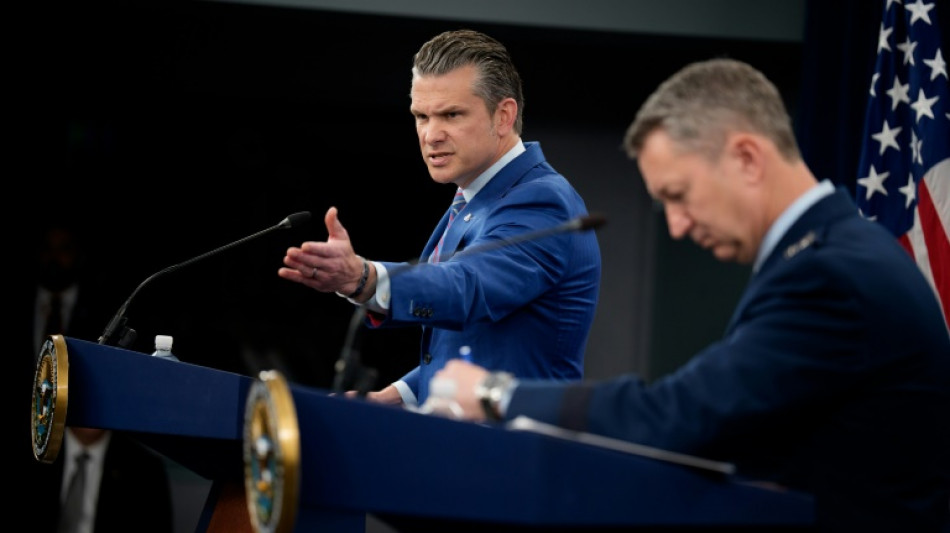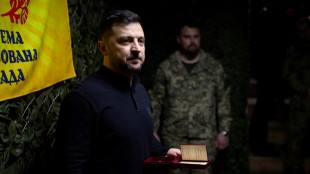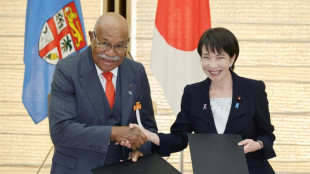
| NGG | 0.45% | 78.38 | $ | |
| RYCEF | -0.47% | 14.96 | $ | |
| CMSC | -0.33% | 24 | $ | |
| SCS | 0.13% | 15.77 | $ | |
| RBGPF | -0.06% | 78.47 | $ | |
| BCC | 0.52% | 70.65 | $ | |
| JRI | -0.36% | 13.82 | $ | |
| BCE | 0.72% | 22.935 | $ | |
| RIO | 0.68% | 71.595 | $ | |
| RELX | 0.36% | 41.51 | $ | |
| VOD | 0.76% | 12.465 | $ | |
| GSK | 1.17% | 48.64 | $ | |
| CMSD | -0.82% | 24.35 | $ | |
| BTI | -2.48% | 54.47 | $ | |
| BP | -0.34% | 36.735 | $ | |
| AZN | 1.83% | 89.315 | $ |
Pentagon chief backs Trump on success of Iran strikes

US Defense Secretary Pete Hegseth insisted Thursday that American strikes on Iranian nuclear sites were a success, backing President Donald Trump and berating the media for covering an intelligence report that questioned the results of the operation.
American B-2 bombers hit two Iranian nuclear sites with massive GBU-57 bunker-buster bombs last weekend, while a guided missile submarine struck a third site with Tomahawk cruise missiles.
"President Trump created the conditions to end the war, decimating -- choose your word -- obliterating, destroying Iran's nuclear capabilities," Hegseth told journalists at the Pentagon, referring to a 12-day conflict between Israel and Iran.
Trump has called the strikes a "spectacular military success" and repeatedly said they "obliterated" the nuclear sites.
On Thursday, he insisted that Iran did not manage to move nuclear materials -- including enriched uranium -- ahead of the US military action.
"Nothing was taken out of facility. Would take too long, too dangerous, and very heavy and hard to move!" Trump said in a post on his Truth Social platform.
However, US media revealed a preliminary American intelligence assessment earlier this week that said the strikes only set back Iran's nuclear program by months -- coverage sharply criticized by Hegseth.
"Whether it's fake news CNN, MSNBC or the New York Times, there's been fawning coverage of a preliminary assessment."
The document was "leaked because someone had an agenda to try to muddy the waters and make it look like this historic strike wasn't successful," Hegseth said.
Trump has also lashed out at coverage of the intelligence report, calling for journalists to lose their jobs.
- 'Get a big shovel' -
Hegseth did not definitively state that the enriched uranium and centrifuges at the heart of Iran's controversial nuclear program had been wiped out, but cited intelligence officials -- although giving little detail -- as saying the nuclear facilities were destroyed.
"If you want to know what's going on at Fordo, you better go there and get a big shovel, because no one's under there right now," Hegseth said, referring to the deep-underground nuclear site.
Among the officials cited by Hegseth was US Director of National Intelligence Tulsi Gabbard, who said the previous day that "Iran's nuclear facilities have been destroyed."
He also referred to a statement by CIA chief John Ratcliffe that said: "A body of credible intelligence indicates Iran's nuclear program has been severely damaged by the recent, targeted strikes."
Ratcliffe pointed to a "historically reliable and accurate" source of information indicating that "several key Iranian nuclear facilities were destroyed and would have to be rebuilt over the course of years."
International Atomic Energy Agency chief Rafael Grossi, speaking Thursday on French radio, meanwhile said Iran's uranium-enriching centrifuges had been knocked out.
"Given power of these (bombs) and the characteristics of a centrifuge, we already know that these centrifuges are no longer operational," Grossi said.
Israel launched an unprecedented air campaign targeting Iranian nuclear sites, scientists and top military brass on June 13 in a bid to end the country's nuclear program, which Tehran says is for civilian purposes but Washington and other powers insist is aimed at acquiring atomic weapons.
Trump had spent weeks pursuing a diplomatic path to replace the nuclear deal with Tehran that he tore up during his first term in 2018, but he ultimately decided to take military action.
The US operation was massive, involving more than 125 US aircraft including stealth bombers, fighters and aerial refueling tankers as well as a guided missile submarine.
R.Song--SG

 London
London

 Manchester
Manchester
 Glasgow
Glasgow
 Dublin
Dublin
 Belfast
Belfast
 Washington
Washington
 Denver
Denver
 Atlanta
Atlanta
 Dallas
Dallas
 Houston Texas
Houston Texas
 New Orleans
New Orleans
 El Paso
El Paso
 Phoenix
Phoenix
 Los Angeles
Los Angeles


